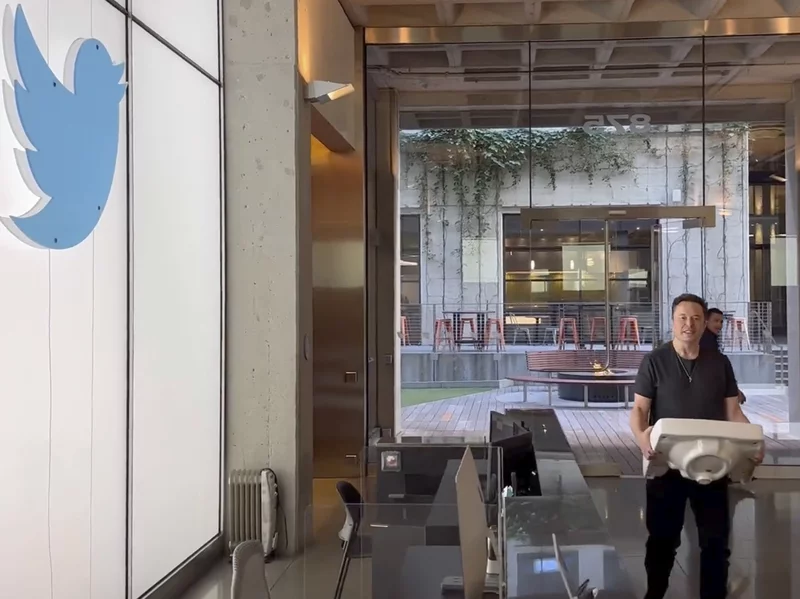Elon Musk has taken control of Twitter and ousted the CEO, chief financial officer and the company’s top lawyer, two people familiar with the deal said Thursday night.
The people wouldn’t say if all the paperwork for the deal, originally valued at $44 billion, had been signed or if the deal has closed. But they said Musk is in charge of the social media platform and has fired CEO Parag Agrawal, CFO Ned Segal and Chief Legal Counsel Vijaya Gadde. Neither person wanted to be identified because of the sensitive nature of the deal.

The departures come just hours before a deadline set by a Delaware judge to finalize the deal on Friday. She threatened to schedule a trial if no agreement was reached.
Although they came quickly, the major personnel moves had been widely expected and almost certainly are the first of many major changes the mercurial Tesla CEO will make.
Musk privately clashed with Agrawal in April, immediately before deciding to make a bid for the company, according to text messages later revealed in court filings.
About the same time, he used Twitter to criticize Gadde, the company’s top lawyer. His tweets were followed by a wave of harassment of Gadde from other Twitter accounts. For Gadde, an 11-year Twitter employee who also heads public policy and safety, the harassment included racist and misogynistic attacks, in addition to calls for Musk to fire her. On Thursday, after she was fired, the harassing tweets lit up once again.
Musk’s changes will be aimed at increasing Twitter’s subscriber base and revenue.
In his first big move earlier on Thursday, Musk tried to soothe leery Twitter advertisers saying that he is buying the platform to help humanity and doesn’t want it to become a “free-for-all hellscape.”
The message appeared to be aimed at addressing concerns among advertisers — Twitter’s chief source of revenue — that Musk’s plans to promote free speech by cutting back on moderating content will open the floodgates to more online toxicity and drive away users.
“The reason I acquired Twitter is because it is important to the future of civilization to have a common digital town square, where a wide range of beliefs can be debated in a healthy manner, without resorting to violence,” Musk wrote in an uncharacteristically long message for the Tesla CEO, who typically projects his thoughts in one-line tweets.
He continued: “There is currently great danger that social media will splinter into far right wing and far left wing echo chambers that generate more hate and divide our society.”
Musk has previously expressed distaste for advertising and Twitter’s dependence on it, suggesting more emphasis on other business models such as paid subscriptions that won’t allow big corporations to dictate policy on how social media operates. But on Thursday, he assured advertisers he wants Twitter to be “the most respected advertising platform in the world.”
The note is a shift from Musk’s position that Twitter is unfairly infringing on free speech rights by blocking misinformation or graphic content, said Pinar Yildirim, associate professor of marketing at the University of Pennsylvania’s Wharton School.
But it’s also a realization that having no content moderation is bad for business, putting Twitter at risk of losing advertisers and subscribers, she said.
“You do not want a place where consumers just simply are bombarded with things they do not want to hear about, and the platform takes no responsibility,” Yildirim said.
Musk said Twitter should be “warm and welcoming to all” and enable users to choose the experience they want to have.
Friday’s deadline to close the deal was ordered by the Delaware Chancery Court in early October. It is the latest step in a battle that began in April with Musk signing a deal to acquire Twitter, then tried to back out of it, leading Twitter to sue the Tesla CEO to force him to go through with the acquisition. If the two sides don’t meet Friday’s deadline, the next step could be a November trial that could lead to a judge forcing Musk to complete the deal.
But Musk has been signaling that the deal is going through. He strolled into the company’s San Francisco headquarters Wednesday carrying a porcelain sink, changed his Twitter profile to “Chief Twit,” and tweeted “Entering Twitter HQ — let that sink in!”
And overnight the New York Stock Exchange notified investors that it will suspend trading in shares of Twitter before the opening bell Friday in anticipation of the company going private under Musk.
Musk is expected to speak to Twitter employees directly Friday if the deal is finalized, according to an internal memo cited in several media outlets. Despite internal confusion and low morale tied to fears of layoffs or a dismantling of the company’s culture and operations, Twitter leaders this week have at least outwardly welcomed Musk’s arrival and messaging.
Top sales executive Sarah Personette, the company’s chief customer officer, said she had a “great discussion” with Musk on Wednesday and appeared to endorse his Thursday message to advertisers.
“Our continued commitment to brand safety for advertisers remains unchanged,” Personette tweeted Thursday. “Looking forward to the future!”
Musk’s apparent enthusiasm about visiting Twitter headquarters this week stood in sharp contrast to one of his earlier suggestions: The building should be turned into a homeless shelter because so few employees actually worked there.
The Washington Post reported last week that Musk told prospective investors that he plans to cut three quarters of Twitter’s 7,500 workers when he becomes owner of the company. The newspaper cited documents and unnamed sources familiar with the deliberation.
Musk has spent months deriding Twitter’s “spam bots” and making sometimes contradictory pronouncements about Twitter’s problems and how to fix them. But he has shared few concrete details about his plans for the social media platform.
Thursday’s note to advertisers shows a newfound emphasis on advertising revenue, especially a need for Twitter to provide more “relevant ads” — which typically means targeted ads that rely on collecting and analyzing users’ personal information.
Yildirim said that, unlike Facebook, Twitter has not been good at targeting advertising to what users want to see. Musk’s message suggests he wants to fix that, she said.
Insider Intelligence principal analyst Jasmine Enberg said Musk has good reason to avoid a massive shakeup of Twitter’s ad business because Twitter’s revenues have taken a beating from the weakening economy, months of uncertainty surrounding Musk’s proposed takeover, changing consumer behaviors and the fact that “there’s no other revenue source waiting in the wings.”
“Even slightly loosening content moderation on the platform is sure to spook advertisers, many of whom already find Twitter’s brand safety tools to be lacking compared with other social platforms,” Enberg said.
Source:https://www.npr.org/




















Add Comment